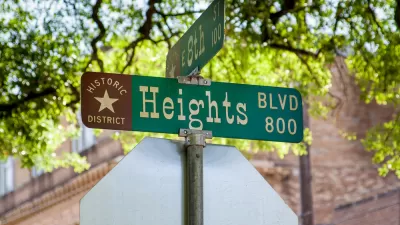Christine McLaren considers the history of urban housing in Berlin, and reveals a long-defunct program designed to address a problem faced by countless communities today.
Often the central controversy surrounding modern revitalization projects, gentrification can sometimes appear to be a contemporary problem. But, as McLaren notes, the basic dilemma of displacement has its roots in historic trends from throughout the 20th century.
Berlin saw the construction of working class housing in droves at the turn of the 20th century. In the post-World War II era, however, conditions in these workers' quarters had declined well below modern standards of basic livability, McLaren explains. "No central heating, no showers, several apartments sharing one toilet. In the winter the pipes and the toilets would freeze and burst. And on top of all this, the apartments were cramped; it was not unusual for five people to share one room."
But when the state government pushed to demolish and rebuild these neighborhoods beginning in the 1950s, some communities protested, hoping to renovate rather than build from scratch. And so, in the 1970s, the government initiated programs to help fund that renovation. "But there was a catch: in order to receive the money to rebuild, property owners had a contractual obligation with the government to ensure that the apartments would remain open to and affordable for the previous tenants after the renovations."
And so communities hired mieterberateren, or rental advisors, to liaise between stakeholders to ensure that as the communities improved, they would remain affordable for their historical constituency.
"The most important thing for us was that, in principle, anyone who wanted to remain living there should have the opportunity to do so. It wasn't that no one from outside could come in, but it should be that the people who lived there had the opportunity to stay," said Hans-Günter Kleff, a former mieterberater.
"Kleff's job no longer exists," writes McLaren. "As the programs to retrofit the buildings slowly petered out, so too did the positions for the people in charge of managing them. That means that if prices go up in these buildings more than they are supposed to, there are fewer people poking around to find out about it."
FULL STORY: Meet the Mieterberater

Alabama: Trump Terminates Settlements for Black Communities Harmed By Raw Sewage
Trump deemed the landmark civil rights agreement “illegal DEI and environmental justice policy.”

Study: Maui’s Plan to Convert Vacation Rentals to Long-Term Housing Could Cause Nearly $1 Billion Economic Loss
The plan would reduce visitor accommodation by 25% resulting in 1,900 jobs lost.

Planetizen Federal Action Tracker
A weekly monitor of how Trump’s orders and actions are impacting planners and planning in America.

Wind Energy on the Rise Despite Federal Policy Reversal
The Trump administration is revoking federal support for renewable energy, but demand for new projects continues unabated.

Passengers Flock to Caltrain After Electrification
The new electric trains are running faster and more reliably, leading to strong ridership growth on the Bay Area rail system.

Texas Churches Rally Behind ‘Yes in God’s Back Yard’ Legislation
Religious leaders want the state to reduce zoning regulations to streamline leasing church-owned land to housing developers.
Urban Design for Planners 1: Software Tools
This six-course series explores essential urban design concepts using open source software and equips planners with the tools they need to participate fully in the urban design process.
Planning for Universal Design
Learn the tools for implementing Universal Design in planning regulations.
Caltrans
Smith Gee Studio
Institute for Housing and Urban Development Studies (IHS)
City of Grandview
Harvard GSD Executive Education
Toledo-Lucas County Plan Commissions
Salt Lake City
NYU Wagner Graduate School of Public Service





























